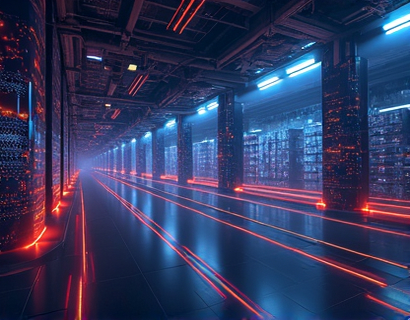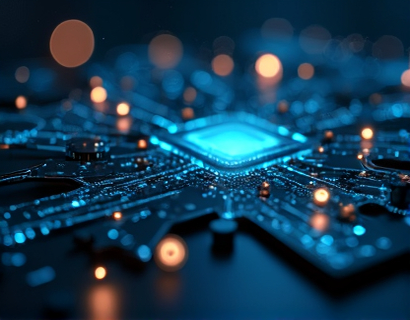AI-Powered Adaptive Learning: Transforming Education for Students and Lifelong Learners
In the rapidly evolving landscape of education, the integration of Artificial Intelligence (AI) has opened new avenues for personalized and adaptive learning experiences. This revolution is particularly significant for students and lifelong learners seeking tailored educational paths that cater to their unique needs and learning styles. An AI-driven platform can deliver personalized, adaptive learning experiences, offering instant feedback and a supportive environment to maximize potential and achieve goals. This approach is designed to be accessible, engaging, and effective, catering to diverse learning preferences and requirements.
The core idea behind AI-powered adaptive learning is to create a dynamic and responsive educational environment. Traditional education systems often follow a one-size-fits-all model, which can leave many students struggling to keep up or feeling under-challenged. By contrast, AI-driven platforms analyze individual student data to adjust the difficulty and type of content in real-time. This ensures that each learner is presented with material that is neither too easy nor too hard, fostering an optimal learning state known as the "zone of proximal development."
One of the key benefits of AI-powered adaptive learning is the ability to provide instant feedback. Unlike human instructors who may not always have the time to offer immediate responses, AI systems can provide real-time corrections and explanations. This immediate feedback loop is crucial for reinforcing correct concepts and quickly addressing misunderstandings. It helps students stay on track and build confidence as they progress through their learning journey.
Moreover, AI-driven platforms can adapt to various learning styles. Some students are visual learners, benefiting from diagrams and videos, while others prefer auditory or kinesthetic methods. An AI system can detect these preferences and tailor the content accordingly. For instance, it might present complex mathematical concepts through interactive simulations for visual learners or use storytelling techniques for those who respond better to narrative formats. This flexibility ensures that each student receives education in a manner that aligns with their natural learning tendencies, enhancing engagement and retention.
The supportive environment created by AI-powered adaptive learning is another significant advantage. These platforms often include features such as progress tracking, personalized recommendations, and motivational prompts. Progress tracking allows both students and educators to monitor advancements and identify areas that need more attention. Personalized recommendations suggest additional resources or exercises based on the student's performance and interests, ensuring a comprehensive learning experience. Motivational prompts, such as badges or progress bars, can boost morale and encourage continued effort.
For students, the personalized nature of AI-driven education means that their unique strengths and weaknesses are taken into account. This individualized approach helps in identifying knowledge gaps and addressing them proactively. Students can work at their own pace, revisiting difficult topics without the pressure of a classroom schedule. This flexibility is particularly beneficial for those balancing multiple responsibilities, such as work and family obligations, allowing them to fit learning into their busy lives.
Lifelong learners, who may not be bound by traditional academic schedules, also benefit immensely from AI-powered adaptive learning. These platforms offer continuous access to a wide range of subjects and skill sets, enabling individuals to pursue their interests and professional development at any time. Whether it's learning a new language, mastering a musical instrument, or acquiring technical skills, AI-driven tools provide the necessary support and structure to achieve these goals.
The adaptive learning algorithms used in these platforms are powered by machine learning techniques. These algorithms analyze vast amounts of data, including student interactions, performance metrics, and feedback. Over time, the system learns from this data to refine its approach, becoming more accurate in predicting what each student needs. This continuous improvement ensures that the learning experience remains up-to-date and effective, adapting to the evolving educational landscape.
Another critical aspect of AI-powered adaptive learning is its ability to foster a collaborative learning environment. While each student receives personalized content, the platform can also facilitate connections with peers who share similar interests or are at similar levels. Discussion forums, group projects, and peer review features encourage interaction and knowledge sharing, enriching the learning experience beyond individual study.
In addition to academic subjects, AI-driven adaptive learning can be applied to professional development and continuous skill enhancement. In the rapidly changing job market, the ability to quickly acquire new skills is invaluable. AI-powered platforms can offer targeted training modules for specific industries or roles, ensuring that professionals stay current with the latest trends and technologies. This not only boosts individual career prospects but also contributes to the overall advancement of the workforce.
The implementation of AI in education also addresses some of the challenges faced by traditional learning environments. For example, teacher shortages in certain subjects or regions can be mitigated by AI-driven solutions that provide high-quality instruction anytime, anywhere. AI can supplement human teaching, taking over routine tasks such as grading and basic question answering, allowing educators to focus on more complex and human-centric aspects of teaching.
Furthermore, AI-powered adaptive learning promotes inclusivity and accessibility. Students with disabilities or those in regions with limited educational resources can benefit from tailored learning experiences that accommodate their specific needs. Features such as text-to-speech, adjustable font sizes, and multilingual support make education more accessible to a broader audience.
The impact of AI-powered adaptive learning extends beyond individual learners to institutions and policymakers. Schools and universities can leverage these tools to enhance their curricula and improve student outcomes. Data-driven insights from AI systems can inform educational strategies, helping institutions identify effective teaching methods and areas for improvement. Policymakers can use this data to develop more informed education policies that support innovation and quality in learning.
As the technology continues to advance, the potential for AI-powered adaptive learning is vast. Future developments may include more sophisticated natural language processing, enabling more intuitive interactions between students and the platform. Integration with virtual and augmented reality could create immersive learning environments that simulate real-world scenarios, further enhancing the educational experience.
In conclusion, AI-powered adaptive learning represents a significant leap forward in education, offering personalized, interactive, and supportive learning experiences. By catering to individual learning styles and needs, these platforms maximize the potential of each student and lifelong learner. As the educational landscape continues to evolve, embracing AI-driven solutions will be crucial for staying relevant and effective in the pursuit of knowledge.










































